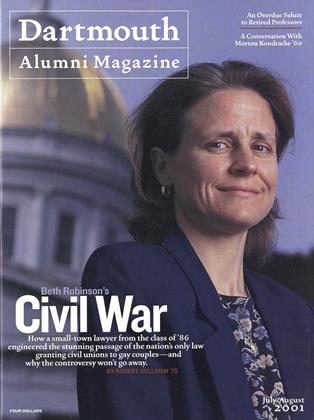Quote/unquote "Imagine, had I your education and had I grown up in such a beautiful country as New Hampshire, think of what else I could have accomplished. I could have won five Nobel Prizes." —LECH WALESA, SPEAKING ON CAMPUS IN APRIL AS A MONTGOMERY FELLOW
Dartmouth has joinedthe ranks of colleges and universities making their financial-aid programs more generous. But it won't be eliminating all student loans, as Princeton recently did.
An abiding philosophy drives Dartmouths decision to give a student financial aid: the students responsibility to bear some of the cost. "We disagree with a no-loan approach," says Karl Furstenberg, dean of admissions and financial aid, in reaction to Princetons recent announcement that the New Jersey university was replacing student loans with grants that do not need to be repaid.
"We feel that it is not unreasonable for students to share the partnership of financing their education," says Furstenberg. "In addition, studies have shown that students who work and borrow to meet tuition requirements perform better in school and graduate at higher rates than those who do not." (President James Wright echoes this sentiment in his column on page 20.)
Dollar for dollar, the College is not able to match Princeton, which enjoys the largest per capita endowment of any college or university in the country. Nevertheless, shortly after Princeton made its announcement the College introduced some enhancements to its own financial aid program. Specifically, Dartmouth added $1.6 million to scholarship resources to reduce the loan burden of first year financial-aid students and cut back on the work expected of students during leave terms as well as within the academic year.
Furstenberg says Dartmouth had concluded before the Princeton announcement that some adjustments needed to be made. "We review our financial-aid policies on an annual basis," he says. "We look at three issues: treating families fairly by using a consistent economic rationale to determine need, paying attention to the competition and determining what the College can afford. Princetons changes provided us with some impetus to come forward with our plans."
Just as the best students compete with each other for a limited number of places at the elite colleges and universities, some of those institutions fight over the best and brightest high school seniors. Increasingly, institutions of higher learning have used the weapon of attractive financial-aid packages to lure "superstar" students.
Bill King '63, chairman emeritus of the board of trustees, reacted on two levels to Princetons announcement. "As chairman," he says, "I focused on how Princetons decision would affect the College on a competitive basis. As an alum, I was concerned as a matter of pride. There always has been competition for the best students among the top colleges and universities, and we've remained creative in providing for student financial needs. Princeton has raised the bar, but Dartmouth will remain competitive."
Furstenberg believes that Princetons change will not influence the make-up of the Dartmouth student body. "Our financial-aid program is very attractive; this change should only make a difference in a small number of cases," he says. "In fact, while Princeton has implemented a comprehensive set of adjustments over the past three years, more incoming freshmen have chosen Dartmouth over Princeton than during the previous three years."
Both Furstenberg and Howard Greene '59, a former admissions officer at Princeton and now president of his own college admissions consulting firm in West port, Connecticut, think that Dartmouth will continue to attract students who perceive that the school offers qualities not found elsewhere. "Dartmouth is unique in the Ivy League," Greene says. "It's a large college with immeasurable resources in a singular location, while the other schools typically are more research-oriented universities in urban environments."
Work Ethic Dean of Admissions KarlFurstenberg says there are benefitsto students who "work and borrow."
 View Full Issue
View Full Issue
More From This Issue
-
 Cover Story
Cover StoryA Civil Action
July | August 2001 By ROBERT SULLIVAN ’75 -
 Feature
FeatureThe Meaning of Emeritus
July | August 2001 By Jay Parini -
 Feature
FeatureGreen Acres
July | August 2001 By ROXANNE KHAMST ’02 -
 Feature
FeatureThe Eyes Have It
July | August 2001 By Liam Kuhn ’02 -
 Faculty Opinion
Faculty OpinionWater Under Fire
July | August 2001 By Joshua Hamilton -
 PERSONAL HISTORY
PERSONAL HISTORYA Breed Apart
July | August 2001 By Marcus Coe ’00








